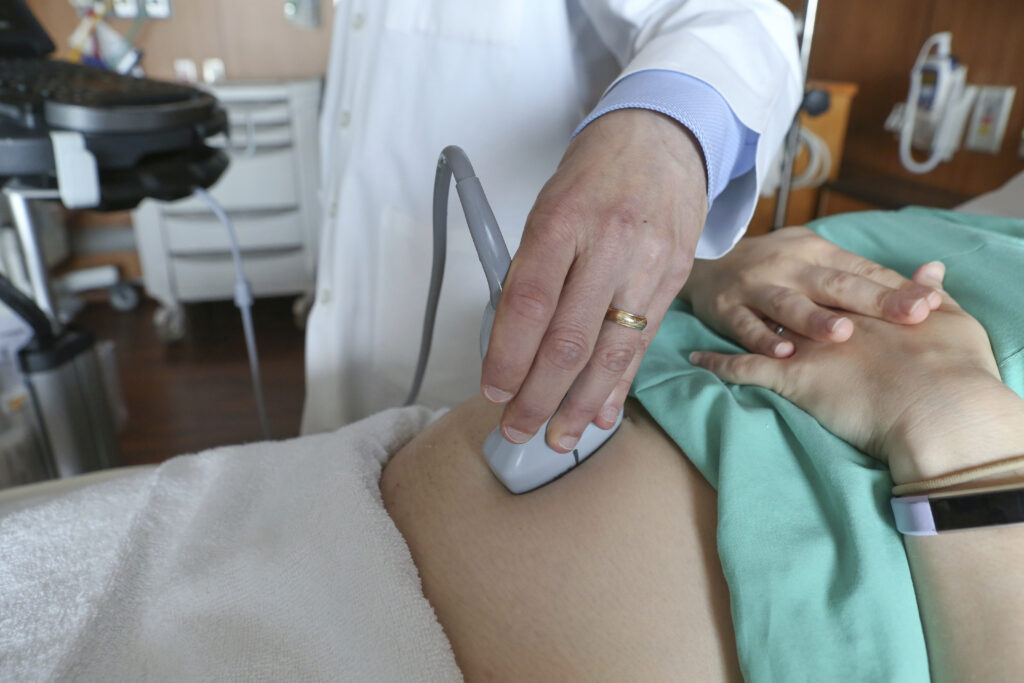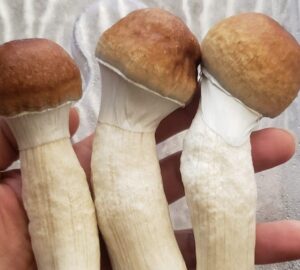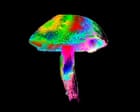This story is part of The Trip, a CPR News series on Colorado’s new psychedelic movement.
Depression during or after pregnancy affects about 15 percent of moms. Meanwhile, there aren’t many treatments given the risks of some anti-depressants. Now, some researchers think psilocybin — or psychedelic mushrooms — could help meet a need among new moms experiencing postpartum depression.
The University of Colorado Anschutz is part of a national study and scientists are accepting trial applicants. Dr. Camille Hoffman is an OB/GYN and spoke with Colorado Matters about the potential and risks of psychedelic experiences in treating postpartum symptoms.
This interview has been edited for length and clarity.
Is there a difference between depression related to pregnancy and what we understand as depression?
Yes and no. We know that those who have a history of depression and then become pregnant are at high risk for postpartum depression. That may be one of the biggest risk factors for it.
However, there are a group of patients who this is their first episode. Does that make them more likely to have a subsequent life episode of major depression? Yes.
Are there some women who only have depression in the postpartum period? Yes. Because that is a time period where there are hormonal fluctuations, changes in oxytocin, changes in sleep that are inherently part of the postpartum experience and unavoidable. But also can be kind of triggers or exacerbators of mood.
Does the stress of motherhood come with it?
Absolutely, yes. The stress of motherhood or sometimes the pregnancy itself has been more anxiety-provoking, which can then kind of lead to a more depressed mood in our culture with generally less familial support.
We know that postpartum people are less buffered from those vulnerabilities and stressors of having an infant.
What’s the current treatment for postpartum depression? Is it any different from what’s used for other forms of depression?
For decades, the default treatment has been psychotherapy. And access to psychotherapy with regularity is more of a challenge for many people. Then traditional antidepressants have been used as kind of the mainstay of medication treatment, even though that is not what they were primarily designed for.
There is a new medication called Zuranolone (brand name Zurzuvae), which is FDA, approved for postpartum depression. As of 2025, that’s the only medication that is specifically approved for postpartum depression.
Now researchers like you are testing psychedelics as potential treatment. What does that look like?
In our lab, there is a treatment dose of this compound that’s called RE104. It’s a psilocin-like compound with a shorter duration. On average, it lasts about three and a half to four hours, instead of six to eight hours like the other oral psilocybin medication also under trials.
Half of the participants will receive the therapeutic dose and half will receive a microdose, which is the placebo for this study. Because there’s no other precedent for psilocybin, the FDA has mandated that in this phase we also need to watch people for eight hours.
In either case, participants have a quiet room and space with a musical track that they listen. Two session sitters are with them for the first five hours. And then our research medical team checks in on them hourly after that, getting some vital signs such as EKGs—which is also part of the investigation of the safety of this compound.
Are some participants scared?
They can come in with fear of doing something like this.
One of the exclusions of the study is having used other psychedelic substances within the prior 12 months. That’s because the investigation team believes that’s probably attracting a different kind of person who may already be more accustomed to the benefits of psychedelics.
But, to alleviate worries, participants interact with the session sitters twice prior to dosing day. So they’ve developed a relationship with those people. They know who’s going to be there with them. At those sessions, participants voice their concerns, and sitters complete the appropriate research assessments and scripts with them.
Participants do experience non-ordinary states of consciousness, which can sometimes be scary. Many investigators feel like that’s part of the experience. Getting through that fear and learning that you’re okay on the other side is comparable to facing the darkness that some might be struggling with. That’s part of how it’s therapeutic.
Psilocybin might have positive impacts on the brain. Are there specific reasons why psychedelic treatment might help with postpartum depression?
We know that the postpartum experience is driven by oxytocin — which some know as the love hormone. We know that in some prior studies looking at LSD that it actually promoted the production of the body’s own oxytocin.
So to be able to do that in the postpartum period — which requires bonding, requires connection and love between a parent and infant — is even more beautiful as a treatment and something other treatment modalities don’t potentially address as well.
One of our participants talked about some fears that she faced during the (psychedelic) journey. Then, on the other side and through an integration session, she realized that there was nothing to fear. She had been through some of her biggest fears, and that now made her much more calm.
Are there risks to women or their babies? What about breastfeeding while taking a dose of psilocybin?
That is a great question. In this phase, there is no lactation component. So people have declined participation in this study because of that.
We try to work around that by making the study out to 12 months postpartum. We talk to those who maybe are planning to wean and are interested in the study. They should check a month after that. But, in this phase, there can be no lactation.
The company who makes this compound is doing a separate lactation study in healthy volunteers. In that study, participants will receive the therapeutic dose at a center in Las Vegas. Then researchers will do all of the appropriate milk and blood testing.
The goal is to start phase three of the trial next year, early 2026. But by then we’ll know how long someone needs to pump and dump or abstain from breastfeeding before they can take psilocybin.
For anyone interested in participating in this trial, what’s the criteria?
Participants have to be within 12 months of giving birth. They do need to have a diagnosis of postpartum depression without other mental health diagnoses. They have to be willing to come into our study center on the day of dosing for an eight hour stay.They must agree to multiple follow up visits — to assess their safety, their mood overall — for 28 days following the study.
The Trip: Alejandro A. Alonso Galva is the project editor. Carl Bilek is the executive producer for Colorado Matters. Andrea Dukakis is a reporter/producer/host for Colorado Matters. Megan Verlee provided editorial guidance. Lauren Antonoff Hart is the digital producer.
Colorado Public Radio Read More




